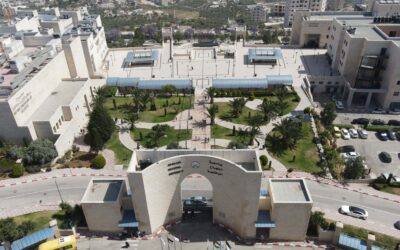An-Najah National University welcomed a high-level delegation from the European Union Office, the Erasmus+ National Office in Palestine, the National Accreditation and Quality Assurance Commission for Higher Education Institutions, and the German Agency for International Cooperation (GIZ).
The delegation included Mr. Federico Foty, Director of Erasmus Programs and Director of the Direct Financial Support Program (PEGASE) and Education Cooperation at the Office of the EU Representative in the West Bank, Gaza Strip, and UNRWA; Mr. Muammar Ishtaywi, President of the National Accreditation and Quality Assurance Commission for Higher Education Institutions; Mr. Iyad Abu Samra, Accreditation Coordinator; Dr. Amir Khalil, Director of the Erasmus+ National Office in Palestine. Representing GIZ were Ms. Sadie O’Mahoney, Program Head, Mr. Maximilian Menges, Program Advisor, and Ms. Maha Al-Ahmad, Deputy Program Head and Senior Advisor, along with representatives from the Ministry of Education and Higher Education.
The delegation was received by Prof. Dr. Abdel Nasser Zeid, University President; Dr. Abdelsalam Al-Khayyat, Vice President for Academic Affairs; Prof. Dr. Abdel Karim Daraghmeh, Director of An-Najah Virtual Academy; Prof. Dr. Saed Al-Khayyat, Director of the Center for Grants and International Projects; and Ms. Samar Abu Mughli, Coordinator of the Office of International Partnerships and Global Initiatives.
The meeting opened with a welcoming speech by the University President, who highlighted the university’s leading position in education and scientific research, showcasing its advanced achievements, particularly its continued presence in international rankings, as well as its active contributions to strengthening international initiatives, partnerships, and research projects that open wide horizons for serving the community.
Dr. Al-Khayyat addressed the main challenges facing the Palestinian academic sector under the current difficult circumstances, affirming the university’s pioneering role in supporting students affected in Gaza by providing continuous educational programs that help safeguard their right to learn and enable them to restore their academic and institutional hopes.
Prof. Dr. Saed presented the European projects secured by the university and their positive impact on the local community, outlining statistics that reflect the expansion of its cooperation networks and multi-stakeholder relations, which allow students and researchers to access advanced educational and research opportunities inside and outside Palestine.
The meeting also discussed ways to enhance future cooperation, develop technical support programs, and foster joint initiatives supporting higher education in Palestine, particularly Erasmus programs that promote student and academic exchanges, institutional capacity building, and research development.
The GIZ delegation and other participants commended An-Najah National University’s pivotal role as a leading national academic institution, expressing their willingness to expand cooperation fields that serve Palestinian students and academics, and strengthen the education and vocational training system in line with local and regional market needs.
In this context, an extended meeting was held to follow up on the BASE Project (Bologna for Science Education in Palestine and Jordan), funded by Erasmus+. Attending were Dr. Abdel Halim Khader, BASE Project Director; Prof. Dr. Munqeth Shteiweh, Dean of the Faculty of Science; and Prof. Dr. Saed Al-Khayyat.
Dr. Khader gave a detailed presentation on the project’s objectives and achievements to date, explaining its role in developing science faculty curricula in line with Bologna Process standards, enhancing graduates’ employability, and increasing academic cooperation among Palestinian, Jordanian, and European universities.
Prof. Dr. Al-Khayyat stressed the importance of European bodies’ support for the project, given its strategic role in advancing higher education in the region. Prof. Dr. Shteiweh emphasized the project’s importance for the Faculty of Science and the readiness of its academic and administrative staff to ensure its success.
The visiting delegation praised the project as an important step toward improving the quality of higher education in Palestine and Jordan, particularly in the Faculties of Science. The meeting concluded with a detailed working session with the Accreditation and Quality Commission to discuss mechanisms for accreditation and degree equivalency within the newly proposed system, aligned with Bologna Process standards and tools.



0 Comments